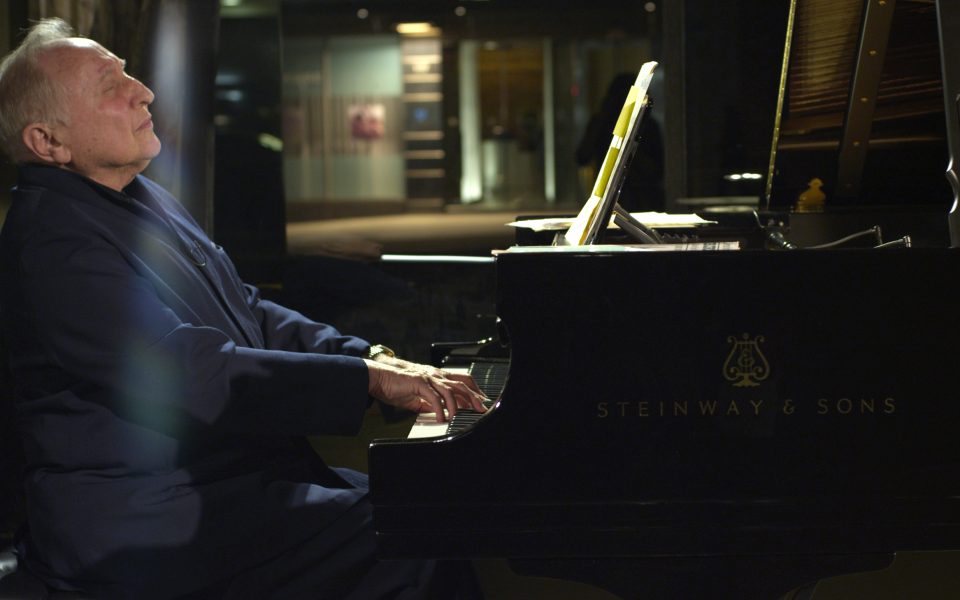by Sayaka Matsuoka
When acclaimed actor Ethan Hawke disclosed his struggle with crippling stage fright to retired concert pianist Seymour Bernstein, he found an artistic guru. It inspired Hawke to direct his first film, Seymour: An Introduction, which delves into the mind and infinite wisdom of Bernstein, the little-known concert pianist who gave up live performance to teach and write his own music. Bernstein, now 87, lives alone on the Upper West Side of Manhattan and teaches burgeoning pianists while composing in his free time.
The documentary opens quietly, with Bernstein coaching himself through a piece of music, adjusting his hands to reach notes and keep the music flowing. The camera pans across Bernstein’s small apartment, capturing his cooped-up life in a one-bedroom fortress of solitude.
Early in the film, Hawke explains to a modest audience prior to a special live concert by Bernstein — the first in more than 30 years — how he met the once-heralded concert pianist at a dinner party.
“I immediately felt kind of safe around him,” Hawke says.
From there, Hawke and Bernstein initiated discussions about art, music, performance and Hawke’s paralyzing fear. Watching the film, it becomes clear that the documentary is not just a look into Bernstein’s life and musings but a beautiful love letter to the piano and, more notably, to the power of music and its effects on people’s lives.
Perhaps the most captivating scenes throughout the 87-minute film are the ones in which Bernstein is seen teaching his padawans. Much like a yoga instructor guides her students through different poses, emphasizing the ebb and flow of their bodies, Bernstein influences his charges by instructing them to feel the music, alternate dynamics and observe posture and breath.
“The most important thing a music teacher can do for his students is to inspire an emotional response, not just for music, but for all aspects of life,” Bernstein says to his pupils in a New York University music class.
The film chronicles Bernstein’s life from his days as a boy, aching to learn piano, through his prime as a concert pianist in his twenties as well as his brief but harrowing experiences in the Korean War where he played short concerts for his fellow soldiers. Bernstein abandoned his rising career after struggling with performance anxiety and becoming disillusioned with the commercial aspect of the industry.
“I thrive in solitude,” Bernstein explains.
Much of the film is narrated by Bernstein as the camera follows the teacher from his apartment where he gives individual lessons to his classes at NYU. Hawke is seen only briefly, ceding all focus to the master. His appearances are complementary throughout the film rather than distracting, with him introducing Bernstein before the concert or explaining his relationship with the pianist. Often, Bernstein speaks directly into the camera, making viewers feel as though they are having one-on-one conversations with him. It creates a rare, intimate sense in a traditionally one-way medium. Rather than participating in the narrative, Hawke makes sure to focus the film on Bernstein, only interjecting to add to these conversations that Berstein facilitates throughout the documentary. The romantic acuity of Seymour Bernstein and his insight into his own life and its impact on others makes viewers introspective and consider how they fit into the narrative of the universe.
Seymour: An Introduction opens on Friday at A/perture Cinema (W-S) and runs through April 16. For tickets and info, visit aperturecinema.com.
Join the First Amendment Society, a membership that goes directly to funding TCB‘s newsroom.
We believe that reporting can save the world.
The TCB First Amendment Society recognizes the vital role of a free, unfettered press with a bundling of local experiences designed to build community, and unique engagements with our newsroom that will help you understand, and shape, local journalism’s critical role in uplifting the people in our cities.
All revenue goes directly into the newsroom as reporters’ salaries and freelance commissions.


Leave a Reply